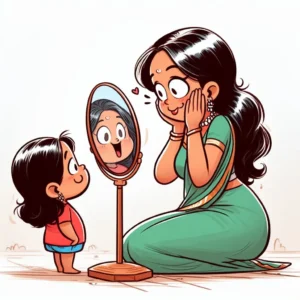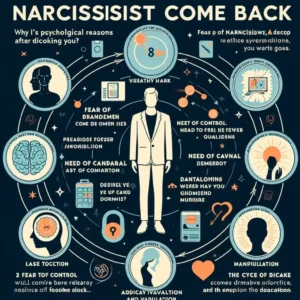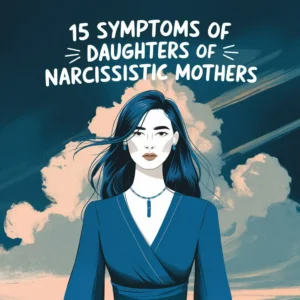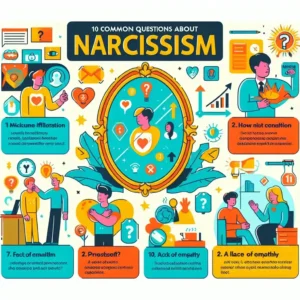You’re likely no stranger to the feeling of being lost in the midst of a relationship, constantly trying to appease your partner while sacrificing your own needs. Or perhaps you’ve mastered the art of people-pleasing, but deep down, you’re haunted by feelings of inadequacy and self-doubt.
If this sounds all too familiar, it may be because you’re an adult daughter of a narcissistic mother. The ways in which your childhood experiences have shaped your relationships and sense of self are complex, but understanding these dynamics is vital to breaking free from the patterns that hold you back.
In a Nutshell

- Adult daughters of narcissistic mothers often struggle with feelings of inadequacy, low self-worth, and people-pleasing due to childhood experiences.
- Recognizing toxic patterns and detaching from emotional drama is crucial to break free from the narcissistic mother’s hold and focus on emotional well-being.
- Daughters may reenact childhood dynamics in romantic relationships, attracting emotionally unavailable partners and feeling responsible for their emotions.
- Reclaiming autonomy and self-worth requires developing a sense of identity, setting healthy boundaries, and prioritizing self-care and self-compassion.
Unraveling the Mother-Daughter Dynamic
As you plunge into the complex web of your relationship with your narcissistic mother, it becomes essential to dissect the intricate dance of emotions, expectations, and power struggles that have shaped your mother-daughter dynamic.
You’ve likely experienced feelings of inadequacy, as if you’re constantly trying to prove yourself worthy of her love and attention. This can lead to mother envy, where you covet the attention and validation she seems to effortlessly receive from others.
Meanwhile, maternal competition can manifest in subtle ways, such as your mother comparing you unfavorably to others or making you feel like you’re in a constant battle for her approval.
It’s vital to recognize these patterns and how they’ve influenced your self-perception and relationships. By acknowledging the unspoken rules and expectations that govern your dynamic, you can begin to break free from the toxic cycle of people-pleasing and self-doubt.
Remember, you’re not alone in this struggle. Many adult daughters of narcissistic mothers have walked this path, and it’s time for you to reclaim your autonomy and self-worth.
As you unravel the complex threads of your mother-daughter dynamic, you’ll discover the freedom to forge a more authentic, empowered version of yourself.
Understanding Narcissistic Mother Traits
You’re likely familiar with the ways your narcissistic mother’s behavior has affected you, but now it’s time to examine the specific traits that drive her actions and interactions. Understanding these traits can help you better navigate your relationship with her and develop strategies for self-care.
Narcissistic tendencies often manifest as a need for admiration, attention, and control. Your mother may constantly seek validation from others, including you, to feel worthy. She may also exhibit maternal jealousy, competing with you for attention and affection from others, including your father or other family members.
This jealousy can lead to manipulative behavior, such as playing the victim or using guilt to get what she wants.
It’s essential to recognize that these traits aren’t about you; they’re about your mother’s own insecurities and fears. By understanding the driving forces behind her behavior, you can begin to detach from the emotional drama and focus on your own emotional well-being.
Emotional Scars of Childhood
As you reflect on your childhood, you may realize that your narcissistic mother’s behavior left emotional scars that still affect you today.
You may have experienced emotional neglect, feeling unseen or unheard, which can lead to feelings of low self-worth and self-doubt.
These childhood experiences can also shape your attachment styles, causing you to fear abandonment or struggle with intimacy in your adult relationships.
Childhood Emotional Neglect
Growing up with a narcissistic mother, your emotional needs were likely neglected, leaving deep scars that still affect you today.
You may have felt like you didn’t matter, that your feelings were insignificant, or that you were a burden to others.
This emotional neglect can manifest in various ways, such as the silent treatment, where your mother would ignore you or give you the cold shoulder when you needed attention or validation.
Emotional invalidation was also a common tactic, where your feelings were dismissed, minimized, or denied, making you feel like you were going crazy.
This lack of emotional support can lead to feelings of emptiness, low self-esteem, and difficulty in forming healthy relationships.
You may struggle with emotional regulation, feeling overwhelmed by your emotions or unable to identify what you’re feeling.
It’s crucial to acknowledge that these scars aren’t a reflection of your worth or value as a person.
You deserve to be seen, heard, and validated.
Acknowledging these childhood wounds is the first step towards healing and breaking free from the toxic patterns of your past.
Fear of Abandonment
One of the most profound emotional scars resulting from childhood neglect is the persistent fear of abandonment, which can haunt you long into adulthood, affecting your relationships, self-worth, and overall sense of security.
This fear can be overwhelming, making you feel like you’re constantly walking on eggshells, never knowing when someone will leave or reject you.
As an adult, you may find yourself stuck in fear patterns, constantly seeking reassurance from others or becoming overly dependent on them.
You may experience abandonment anxiety, feeling a sense of panic or dread when someone cancels plans or doesn’t respond to your messages right away.
Some common signs of fear of abandonment include:
- Difficulty trusting others or forming intimate relationships
- Feeling overly responsible for others’ emotions and actions
Recognizing these patterns is the first step towards breaking free from the grip of fear and anxiety.
Insecure Attachment Styles
Your experiences with a narcissistic mother have likely shaped your attachment style, leading you to develop insecure patterns of relating to others that can perpetuate feelings of anxiety and low self-worth.
As an adult, you may find yourself struggling to form healthy, fulfilling relationships or experiencing intense emotional reactivity in your interactions with others.
| Attachment Style | Characteristics | Impact on Relationships |
|---|---|---|
| Anxious | Preoccupation with rejection, clinginess, and emotional dysregulation | Attracts dismissive partners, perpetuates feelings of anxiety and insecurity |
| Dismissive | Avoidance of intimacy, emotional unavailability, and self-sufficiency | Attracts anxious partners, reinforces feelings of loneliness and disconnection |
| Fearful-Avoidant | Fear of rejection and intimacy, emotional unavailability, and self-protectiveness | Struggles to form close relationships, experiences feelings of isolation and disconnection |
You may identify with one or more of these insecure attachment styles, which can stem from the emotional scars of childhood. Recognizing your attachment patterns is the first step towards breaking free from these limiting dynamics and cultivating healthier, more fulfilling relationships.
By acknowledging and working through these insecurities, you can begin to develop a more secure attachment style, leading to increased emotional well-being and a deeper sense of connection with others.
Impact on Adult Relationships
As adult daughters of narcissistic mothers navigate romantic relationships, they often find themselves reenacting childhood dynamics, with their partners unwittingly assuming the role of emotional caretaker. You may find yourself drawn to romantic partners who are overly attentive or controlling, as a way to compensate for the emotional neglect you experienced in childhood. However, this can lead to an unhealthy dynamic, where you become overly dependent on your partner for emotional validation.
Social pressures can also play a role in shaping your relationships. You may feel pressure to present a perfect facade, hiding any signs of conflict or imperfection from friends and family. This can lead to feelings of isolation and disconnection from your partner.
Some common patterns to watch out for in your relationships include:
- Attracting partners who are emotionally unavailable or inconsistent
- Feeling responsible for your partner’s emotions and well-being
Struggling With Self-Identity
Growing up with a narcissistic mother can leave you with a fragmented sense of self, making it difficult to identify your own desires, values, and goals. You may feel like you’re living someone else’s life, constantly seeking external validation to fill the void within. This can lead to a lifelong struggle with self-identity, making it hard to distinguish your own thoughts, feelings, and needs from those of others.
As you set out on your self-discovery journey, you may find yourself grappling with inner validation struggles. You may question your own decisions, second-guess your choices, and doubt your abilities. It’s as if you’re trying to find your way through a maze with no clear exit.
But know that you’re not alone. Many adult daughters of narcissistic mothers face similar challenges.
To break free from this cycle, it’s crucial to develop a deeper understanding of yourself. Take time to reflect on your values, passions, and strengths. What makes you tick? What brings you joy? What’re your non-negotiables?
Breaking Free From People-Pleasing
You’ve likely spent years trying to gain your mother’s approval, constantly adjusting your behavior to meet her expectations, and now you’re stuck in a pattern of people-pleasing that’s hard to shake.
This pattern has become a deeply ingrained habit, making it challenging to decipher what you truly want versus what others expect from you.
Breaking free from people-pleasing requires recognizing that your self-worth isn’t defined by others’ opinions.
To start, focus on developing self-care strategies that nourish your mind, body, and soul.
- Prioritizing activities that bring you joy and make you feel alive
- Practicing self-compassion and acknowledging your emotions
Setting Healthy Boundaries
Establishing healthy boundaries is a crucial step in reclaiming your autonomy, as it allows you to define what you’re comfortable with and what you’re not, thereby protecting your emotional well-being.
This means setting clear limits with others, including your mother, about what you’re willing to do and what you’re not.
By doing so, you’re taking control of your life and prioritizing your own needs.
Boundary setting is an act of self-protection, ensuring that you’re not drained or depleted by others’ demands.
Recognizing that your boundaries aren’t selfish, but necessary for your emotional survival is imperative.
When you set healthy boundaries, you’re communicating your values and needs clearly, which can lead to more authentic relationships and a greater sense of self-respect.
Remember, you can’t pour from an empty cup, so take the time to establish boundaries that nourish and protect you.
Pathways to Healing and Recovery
As you’ve learned to set healthy boundaries, you’re now poised to venture on a journey of self-discovery and healing, where you’ll uncover the root causes of your emotional pain and develop strategies to overcome them. This journey requires courage, patience, and compassion, but it’s a vital step towards breaking free from the shackles of your mother’s narcissism.
To facilitate your healing, consider incorporating the following practices into your daily routine:
- Self-reflection exercises: Schedule regular time for introspection, exploring your thoughts, feelings, and behaviors. Ask yourself questions like ‘What triggers my anxiety?’ or ‘What are my non-negotiables in relationships?’
- Journaling: Write down your experiences, emotions, and insights. This helps process your feelings, identify patterns, and gain clarity on your values and desires.
Frequently Asked Questions
Can I Still Have a Relationship With My Narcissistic Mother?
You’re wondering if you can still have a relationship with your narcissistic mother. Yes, but it’s vital to set clear boundaries and maintain emotional distance to protect yourself from toxic dynamics and preserve your mental well-being.
Will I Become a Narcissist Because of My Upbringing?
You’re wondering if your upbringing will condemn you to narcissism. Fortunately, research suggests that’s not a guaranteed fate. Recognizing trauma patterns and acknowledging maternal influence can empower you to break free from those cycles and forge a healthier path.
How Do I Deal With Feelings of Guilt and Shame?
“When guilt and shame creep in, you practice self-compassion strategies like acknowledging emotions, reframing negative thoughts, and treating yourself kindly. Also, try emotional unloading techniques like journaling or talking to a trusted friend to release the weight.”
Can I Ever Fully Recover From Childhood Emotional Abuse?
You can recover from childhood emotional abuse by acknowledging the trauma imprinting that’s shaped your beliefs and behaviors, and then intentionally triggering an emotional reset, allowing you to rewire your thought patterns and break free from the past.
Is It Possible to Forgive My Mother and Still Set Boundaries?
‘You can forgive your mother without forgetting the pain, but it’s vital to separate the forgiveness process from boundary assertiveness – prioritize your emotional well-being by setting clear limits while letting go of resentment.’




James Green is a seasoned psychologist specializing in narcissism and other personality and relationship issues. With a passion for helping others understand and navigate their own personality traits and relationships, James shares his insights and expertise on his blog, Personality Diaries. Connect with him on Pinterest and Instagram for regular updates and insights.



















































